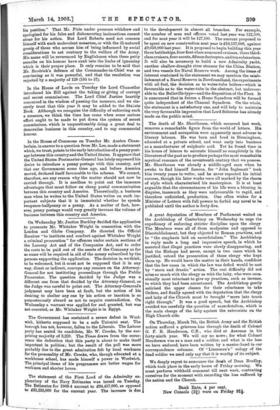A great deputation of Members of Parliament waited on the
Archbishop of Canterbury on Wednesday to urge the expediency of enforcing stricter discipline upon the clergy The Members were all of them moderates and opposed to Disestablishment, but they objected to Roman practices, and to "the emphasis laid on sacerdotalism." The Archbishop in reply made a long and impressive speech, in which he asserted that illegal practices were slowly disappearing, and that the Bishops had never, except in two cases which he justified, vetoed the prosecution of those clergy who kept them up. He would leave the matter in their hands, confident that the few cases in which the law was defied would be met by "stern and drastic" action. The real difficulty did not arise so much with the clergy as with the laity, who were occa- sionally most reluctant to give up practices, such as incense, to which they had been accustomed. The Archbishop gently satirised the upper classes for their reluctance to take Orders, and finally agreed with the deputation that the clergy and laity of the Church must be brought "more into touch right through." It was a good speech, but the Archbishop avoided too carefully the question of sac,erdotalism, which is the main charge of the laity against the extremists on the High Church side.










































 Previous page
Previous page